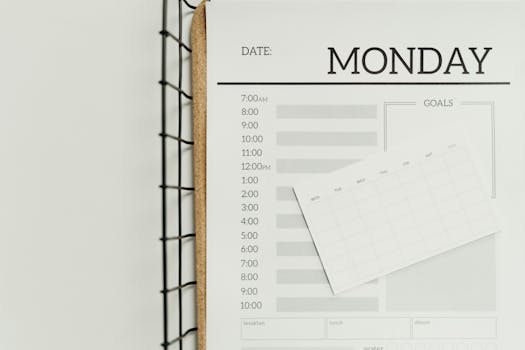
Table of Contents
- What are SMART Goals?
- Why SMART Goals are Important for Time Efficiency
- How to Set SMART Goals
- Examples of SMART Goals
- Monitoring Your Progress
What are SMART Goals?


Specific
Specific goals clearly define what you want to achieve. Instead of saying, “I want to be healthier,” a specific goal would be, “I want to exercise for 30 minutes, five times a week.” This specificity provides you with a clear direction.
Measurable
Measurable goals allow you to track your progress and see how far you’ve come. Going back to our exercise example, measuring progress could involve tracking the number of workouts completed or the minutes exercised each week.
Achievable
Achievable goals are realistic and attainable. While it’s great to aim high, setting goals that are too far-fetched can lead to frustration. Ensure that your goals stretch your abilities but remain possible.
Relevant
Relevant goals align with your broader objectives and values. They should matter to you and support your long-term aspirations. For instance, if your goal is to advance your career, a relevant goal could be to complete a professional certification.
Time-bound
Time-bound goals have a deadline. This element creates urgency and helps prioritize your tasks. Instead of saying, “I want to learn a new skill,” a time-bound goal would be, “I want to complete an online course in digital marketing by the end of the month.”
Why SMART Goals are Important for Time Efficiency
Setting SMART goals is crucial for enhancing your time efficiency. Without clear goals, your time can easily slip away into unproductive activities. Here’s why they matter:
Clarity and Focus
SMART goals give you a clear path to follow, reducing ambiguity about your tasks. When you know exactly what you need to do, you spend less time deciding what to tackle next.
Improved Motivation
When you set achievable and relevant goals, you’re more likely to stay motivated. Each small victory along the way can boost your morale and encourage you to keep pushing forward.
Better Time Management
With specific deadlines and measurable outcomes, SMART goals help you prioritize your tasks effectively. You can allocate your time to the most important activities, ensuring that you use each moment wisely.
Accountability
When you share your SMART goals with others or keep track of your progress, you create a sense of accountability. This can prompt you to stay committed to your goals and manage your time better.
How to Set SMART Goals

1. Identify Your Objectives
Begin by determining what you want to achieve. This could be related to personal development, career advancement, health, or any other area of your life.
2. Write Down Your Goals
Document your goals in a clear and concise manner. Writing them down makes them tangible and reinforces your commitment.
3. Break Down Your Goals
Divide larger goals into smaller, manageable tasks. This makes them less daunting and allows you to track progress more easily.
4. Set Deadlines
Assign deadlines to each of your goals and tasks. This will help you stay on track and maintain a sense of urgency.
5. Review and Adjust Regularly
Regularly assess your progress towards your goals. If you find that certain goals are no longer relevant or achievable, don’t hesitate to adjust them.
Examples of SMART Goals

Health Goal
Specific: I will run three times a week for 30 minutes. Measurable: I will track my runs using a fitness app. Achievable: I can start by running for 15 minutes and gradually increase. Relevant: This aligns with my desire to improve my fitness. Time-bound: I will achieve this for the next three months.
Professional Goal
Specific: I will complete a project management certification. Measurable: I will finish one module per week. Achievable: I have the time to dedicate to this course. Relevant: This will help me advance in my career. Time-bound: I will complete it within six months.
Personal Development Goal
Specific: I will read one book on personal development each month. Measurable: I will track my reading progress in a journal. Achievable: I can allocate 20 minutes each day to read. Relevant: This supports my goal of continuous learning. Time-bound: I will complete 12 books by the end of the year.
Monitoring Your Progress

Use a Journal or Planner
Keep a dedicated journal or planner where you can note your daily or weekly progress. This will help you stay accountable and see how much you’ve accomplished.
Set Milestones
Break your goals into smaller milestones and celebrate when you reach them. This not only motivates you but also gives you a clear picture of your journey.
Seek Feedback
Share your goals with friends, family, or colleagues. Getting feedback can provide new insights and help you stay committed.
Reflect and Adjust
Take time to reflect on what works and what doesn’t. Be flexible and adjust your goals as necessary to stay aligned with your overall objectives.







